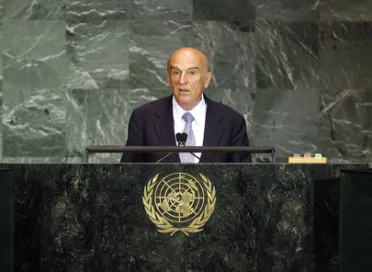Statement
Statement summary
HANS-RUDOLF MERZ, President of Switzerland, said the recent economic crisis and collapse of the global financial system had illustrated the interconnectedness between and among nations. It also served to remind Member States that other global challenges, among them, climate change, the food crisis and pandemics, were not confined to national borders. Confronting those challenges required a concerted and coordinated international cooperative response. “The United Nations is the place where this cooperation happens. Today, the world needs the United Nations more than ever,” he said.
To ensure the success of the Organization and its initiatives, he called for the strengthening of ties between the United Nations and other mechanisms such as the G-20, which “had taken over an important role in the discussion of important global issues”. He cautioned that that development must not undercut the efforts of other, more inclusive institutions. Further, he stated that economic activities needed to adhere to the fundamental values of economic, social and environmental sustainability.
Utilizing institutions such as the International Monetary Fund, the World Bank and United Nations Development Programme (UNDP), the Organization was equipped with the tools to address the financial crisis. He said that, although reforms were crucial to address recent failures and abuses, a liberal economic order and open market system had lifted many people around the world out of poverty, and he supported the United Nations’ call for the swift conclusion of the Doha Round of World Trade Organization negotiations.
Because developing countries were hardest hit by the financial crisis, there was concern that broad achievement of the Millennium Development Goals would be delayed. Despite budget constraints, Switzerland pledged to maintain its level of development aid, as developing and developed countries were partners in achieving the Goals. Turning to climate change, he expressed Switzerland’s support for a successful conference in Copenhagen in December and committed his country to achieving its CO2 reduction targets for 2012, and preparing to cut their emissions by 20 per cent by the year 2020.
He went on to say that, the cost of adaptation to climate change would amount to tens of billions of dollars a year, half of which would be at the expense of developing countries. With that in mind, he proposed a global carbon tax based on the “polluter-pays” principle in order to tackle those expenses.
On United Nations peacekeeping and peacebuilding activities, in taking over the chairmanship of the Burundi configuration of the Peacebuilding Commission, and continuing its initiative on Armed Violence and Development, Switzerland supported the strengthening and expansion of the Organization’s prevention and mediation capacities. On the sixtieth anniversary of the Geneva Convention, and in light of the difficulty in ensuring respect of its rules due to the new forms of warfare, Switzerland would be organizing a ministerial side-event in New York during the General Assembly, as well as an international expert conference in Geneva in November, which would be open to all State parties to the Geneva Convention.
Full statement
Read the full statement, in PDF format.
Photo

Previous sessions
Access the statements from previous sessions.
